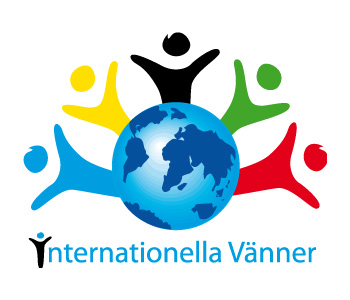SIRU 2.0 Case: Laserkraft and Internationella Vänner

SIRU 2.0 is financed by by Tillväxtverket with EU funding, and by Region Jönköpings län.
Cooperation for inclusion and competence provision!
The subcontractor who works proactively with the environment and inclusion!
Laserkraft, like many other companies in the Jönköping Region, is a manufacturing company that does not have its own products but supplies to a large number of larger companies, not least to the automotive industry (BT/Toyota, Scania and Hiab). Steel is the backbone of Laserkraft's manufacturing and the company processes around 100 tons a week; through laser cutting, edge pressing, welding and assembly. Around 20% of the material becomes waste and is returned to SSAB for remelting and reuse.
Something that distinguishes many smaller companies in Småland is that they are at the forefront in various areas, and Laserkraft is no exception. What is perhaps most visible at Laserkraft are the innovations in technology and organization.
Laserkraft was the first in Sweden to use a 30 kW fiber laser, they have installed warehouse lifts to optimize their warehouse and removed the production manager position to build a very flat organization instead. There are still other innovations that are equally important to the company's success which have been integrated into the production methods. Innovations that address both social and ecological challenges.
Quick Facts - Laserkraft
- Founded: 1993
- Located in: Bredaryd, Värnamo municipality.
- Family business? No (family-owned until 2011, now owned by Anicho Invest AB)
- Turnover (2022): SEK 260,000 million.
- Profit margin (2021): 9.7%
- Growth (turnover in 2021): 38.6%
- Employees: 90 (150 in the entire group)
- Sustainability certifications? Yes: ISO 14001
- Case author: Duncan Levinsohn Opens in new window.
Developing a partnership for inclusion
Laserkraft is located in Bredaryd, about 2 miles outside Värnamo. Like many industrial communities in Småland, the company has experienced an increasing shortage of labor in recent years. This is despite the fact that Värnamo municipality received a significant number of refugees during the same period, a group that has had difficulty establishing themselves on the labor market - due to a lack of knowledge in Swedish (amongst other things). Since 2006, the association Internationella Vänner (International Friends) has been working [1] to ensure that refugees and other new Swedes are integrated into Swedish society. With Peter Lagerman at the helm, sub-projects have been established to tackle the various challenges that new Swedes face, eg through projects titled 'young friends' External link, opens in new window. and 'adult friends External link, opens in new window.'. Eventually it was realized that it is difficult to become part of society if you do not have a job - and so 'business friends' External link, opens in new window. was born. This initiative is run by Göran Nilsson today.
By becoming a 'business friend', local businesses support newcomers' journey to joining the labour market, while developing the workforce the region needs. Internationella Vänner act as bridge builders between civil society and companies, and identify individuals who are ready for Swedish working life. They help with documentation and applications, not least when it comes to work and residence permits, and sometimes they hire individuals for shorter periods, so that companies have the opportunity to let new Swedes work part-time before moving on to formal permanent employment. The initiative is beneficial for both the companies and the individual.
As Laserkraft's Mikael Norin notes: "they don't have any luggage or preconceived notions about what we do and don't do [...] they learn amazingly fast, are extremely talented, and want to enter Swedish society".
[1]The association was formally founded in 2013, but has been active under the auspices of the Studieförbundet Vuksenskolan since 2006.

Proactive work with sustainability certification
By getting involved with new arrivals, Laserkraft invests not only in their future, but also in its own, long-term competence supply. The same perspective applies to the company's work with environmental issues. Initially, work began with certification based on the requirements of the automotive industry. Since then, the company has been increasingly proactive and invested in becoming certified before the customer demands it. That is why today it has been environmentally certified according to ISO 14000 and has begun the tough process towards certification of their occupational health and safety (OH&S) management system according to ISO 45001.
Quick Facts - Internationella Vänner (International friends)
- Founded: 2013
- Located in: Head office in Värnamo, operations in 20 municipalities, in Jönköping and Kronoberg counties.
- Family business? No (Non-profit organisation)
- Employees: 10 (2 fulltime)
- Sustainability certifications? No
- Case author: Duncan Levinsohn Opens in new window.
In which areas is the company committed to sustainability and social innovation?
- The company recruits in an inclusive manner, and primarily with a focus on new Swedes. To be able to do this, the company has developed special technical aids and management skills. A simple technical innovation that nevertheless had a great impact is the visualization of work steps in production, to support employees who have difficulty reading Swedish - or who cannot read at all. In order to take advantage of the skills of new Swedes, supervisors have had to develop new management skills - where intercultural understanding has been particularly important to promote cooperation in a group with different religions and ethnicities.
- Cooperation with other companies to enable investment in the area. Some initiatives in local society require strong participation from companies because the contribution made by individual citizens is not enough. In Bredaryd, the municipality's investment in district heating is an example of such an initiative. It would probably not have happened if the companies had not joined forces and supplemented the investment from individual homeowners.
- The company 's financial success is strongly linked to its sustainability work. Laserkraft is a clear example of sustainability work that pays off, both in terms of the environment and the social aspect. Being proactive about environmental certification is an investment that is both a 'hygiene factor' (necessary for the customer to buy), and a 'bonus' factor that can be decisive when a customer chooses between several suppliers. As Mikael Norin puts it: "If we do this, we make money, it's not a cost!". Developing the company so that it can take advantage of the skills of new Swedes also benefits the company in an environment where labor is in short supply.
- Own rehabilitation when society is not enough. In a smaller company as in a large, sickness absence occurs for various reasons, and Laserkraft's experience is that traditional community initiatives for rehabilitation and care are rarely enough. It is one thing for the state to pay sickness benefits, but quite another to go from the point of illness back to health and work. The company's experience is that the organization's commitment and good cooperation with the union are crucial for individuals to become healthy.
- The company sponsors local association life (sports, etc.). Laserkraft regularly sponsors local sports associations (BIK and BSOK), and has also sponsored other sports activities when there has been a need, for example: motocross and speedway. At regional level, the company also sponsors the hockey club HV71.
How does the company address societal challenges in an innovative way?
The exciting thing about Laserkraft's work is not that the company worked with a single big social innovation, but with a number of smaller innovations. The management at the company has learned that you can get more out of all your employees by adapting their work situation and treatment. Adapting the work to the needs of new arrivals thus becomes just another micro-innovation.
For example:- Drawing instructions instead of writing in text.
- Validating the competence of a work group instead of an individual
- Adapting working hours to language studies or commuting.
The collaboration with Internationalla Vänner is also innovative: it has been discovered that public actors are sometimes slow to progress but this collaboration has created new relationships that make the work progress faster - and sometimes more efficiently.
What social benefit does the company create?
- The company creates job opportunities for individuals both in its immediate area and in the region, work that has been largely adapted to the individual's conditions, not least among those born abroad.
- The company promotes integration as socialisation and community at work can often lead to socialisation and community in leisure time. As Mikael Norin puts it: "Abdullah gets to know Nils and Bengt and Olle, and then maybe they start playing a little paddle. And then they meet on Saturday night to watch Manchester United against Arsenal, and then it's poker night. This grows and then Abdullah has a friend, and then he joins the group. And then they ask "what do you do?" “No, I don't have a job.” “Yes, but come to Laserkraft.” And so he comes into the team.
- The company helps other companies and local organizations to reduce costs and emissions by participating in the municipality's investment in district heating .
Is there anything preventing the company from becoming even more sustainable?
Laserkraft, like many other subcontractors, is to some extent dependent on its customers to bring about the final improvements in ecological sustainability. In most cases, the challenge is about logistics, as the company needs to adapt its delivery to the customer's inventory system. For example: pallets for different customers must not be mixed, which makes it difficult to switch to pallets made from materials that can be recycled. Or the customer orders only a few copies of a product, but requires it to be delivered on an entire pallet to suit their own warehouse system. In addition, the customer wants Laserkraft to use only pallets with their logo on them, and delivery often takes place without collaboration with other customers. "We think it's complete madness," says Mikael Nordin, "we just send air!" So there is much to improve on the client's side, in order for the entire supply chain to become as 'green' as possible.
What makes the company particularly interesting as an example?
The collaboration between Laserkraft and Internationalla Vänner is unusual, but not unique in Småland. The region is characterized by entrepreneurship and a strong civil society. There are few really large companies that have established themselves in the region, but on the other hand there are a lot of smaller companies (many of whom are subcontractors to the automotive industry). Companies are used to adapting to the client's requirements and have a pragmatic, solution-oriented way of taking on challenges - both in their own company and in the area.
Smaller communities make room for effective networks and relationship-based collaboration. The collaboration between Laserkraft (Bredaryd) and Internationella Vänner (Värnamo) is something that also exists in Gislaved - between the organization Framtidscentrum AB and the company Proton Finishing . There, the focus is also on the integration of new arrivals, howeverin Gislaved there is a stronger 3 part collaboration - where the municipality has also been heavily involved.


